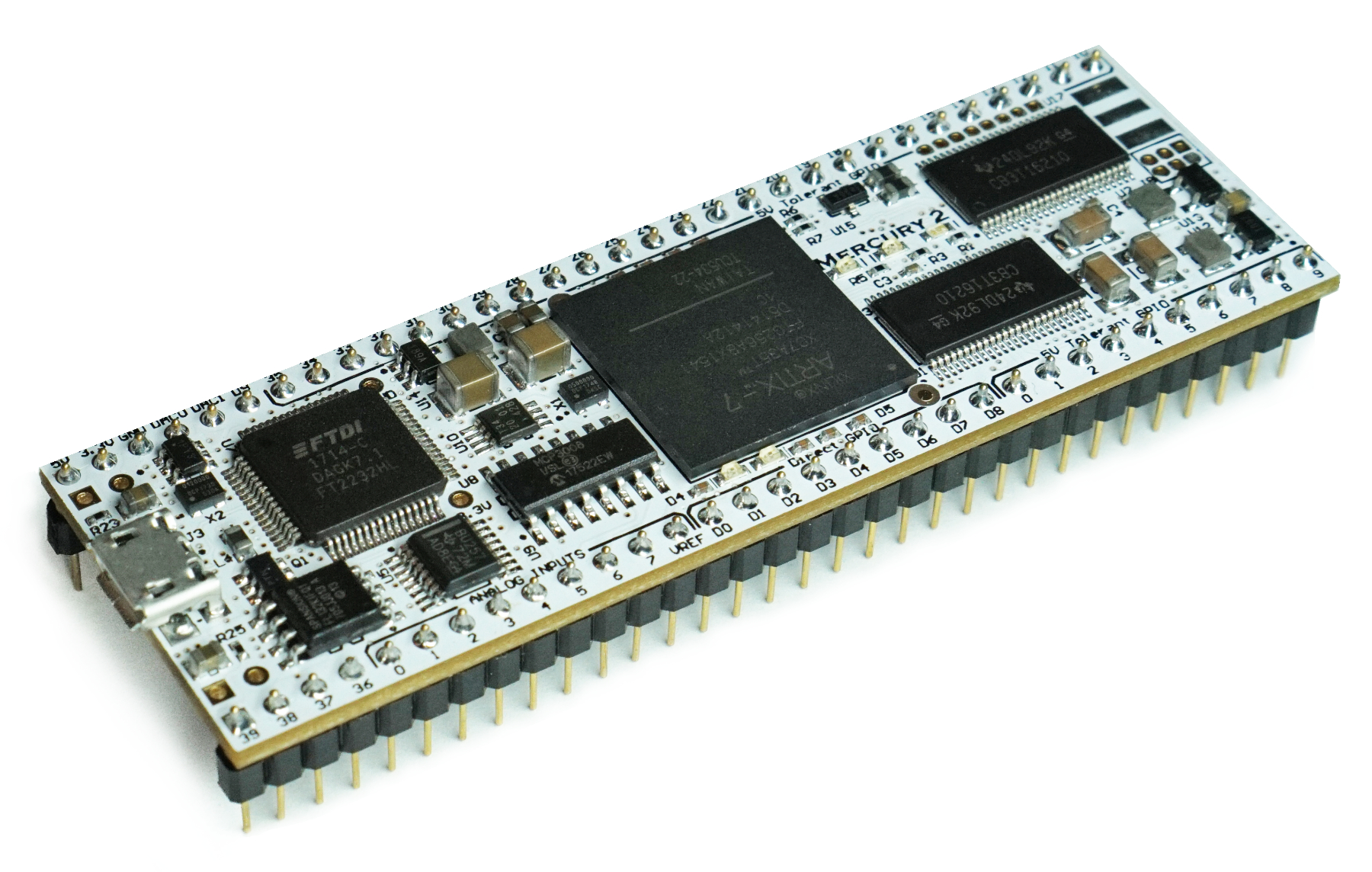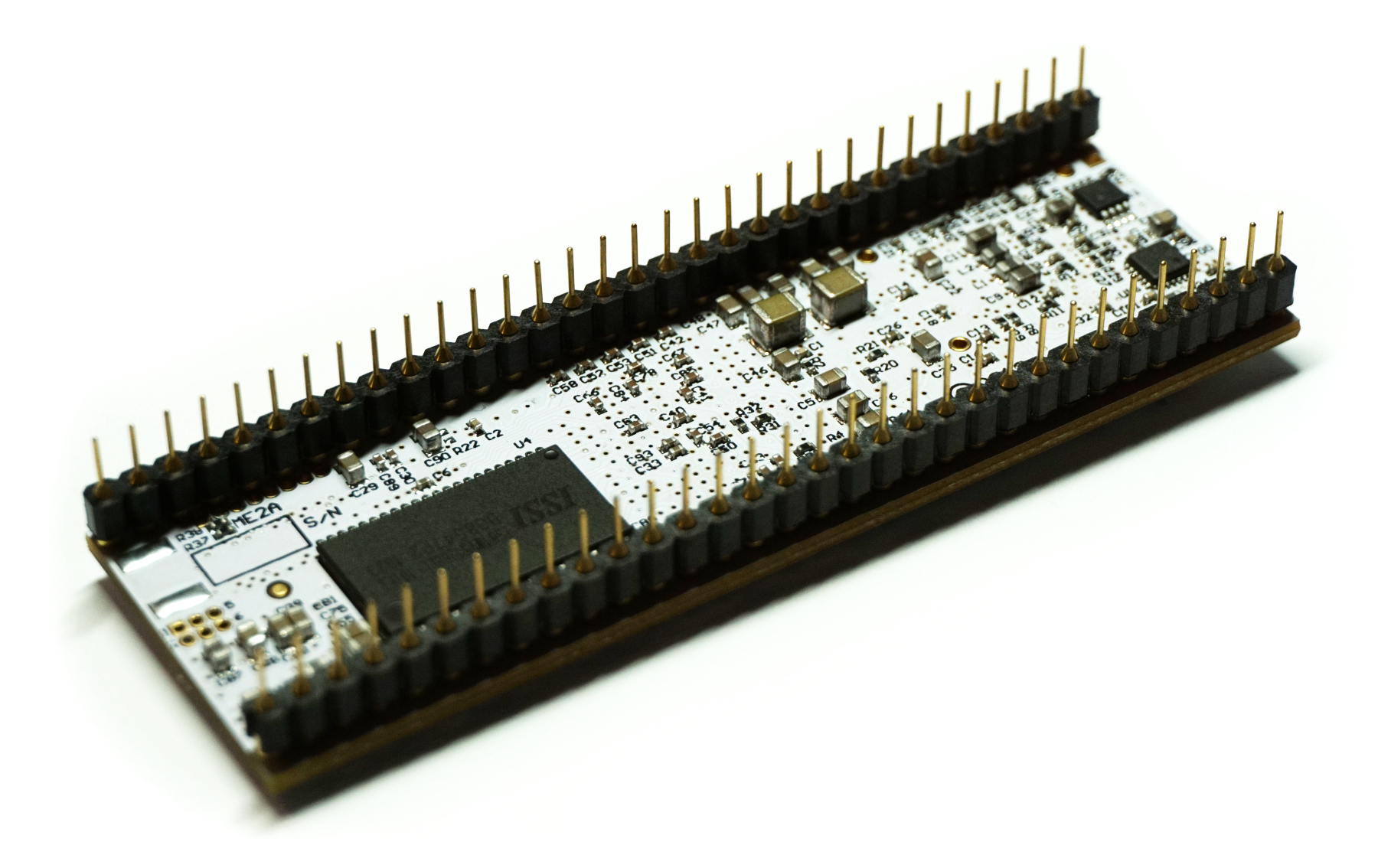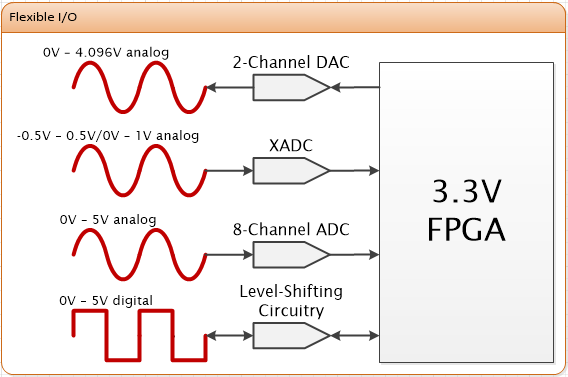Mercury 2 FPGA Development Board


| Part # | FPGA | SRAM | Price (USD) | Status |
|---|---|---|---|---|
| ME2A-35T-4M | A7-35T | 4Mbit | $139 | In Stock |
| ME2A-35T-16M | A7-35T | 16Mbit | $169 | In Stock |
| ME2A-100T-16M | A7-100T | 16Mbit | $249 | 1 month lead time |
Mercury 2 block diagram (click for larger view)
Technical Specifications
Xilinx Artix-7 FPGA (XC7A35T or XC7A100T)
FTDI FT2232H 480Mbps USB 2.0 interface
Channel A: device configuration and debugging (SPI Flash programming and USB-JTAG interface)
Channel B: user-configurable interface between the FPGA and host for high-speed data transfer
50MHz MEMS oscillator (±50ppm)
External Memory
32Mbit SPI configuration / user Flash
4Mbit (512K x 8-bit) or 16Mbit (2M x 8-bit) 10ns asynchronous SRAM
Analog I/O
Microchip MCP 3008 8-channel, 200 KSPS, 10-bit ADC
Microchip MCP 4812 2-channel, 225 KHz, 10-bit DAC
Artix-7 internal XADC 1MSPS , 12-bit ADC, accessible on dedicated ADC input or mappable to FPGA-direct IO
Digital I/O
40x 5-volt tolerant IO pins provided by 2x TI SN74CB3T16210 bus switches
10x FPGA-direct high speed IO pins
3x User LEDs
On-board Microchip LAN8720A 10/100 Ethernet PHY
Expansion headers for Ethernet and Wi-Fi communication modules
6-pin header for direct JTAG interface to the Artix-7 FPGA
Power
Powered from Micro USB input or external 4.5 - 5.5V regulated power source
On-board high-efficiency switching regulators for 3.3V, 1.8V and 1.0V rails
Made in America
Mercury 2 is proudly designed and assembled in the United States, at our in-house SMT assembly line. This allows us to ensure the highest production quality, and gives us the flexibility to quickly customize aspects of Mercury 2 to your specifications (part substitutions, industrial temperature range, etc.) Contact us today if you are interested in a customized Mercury 2 order, or if you are interested in our engineering services including custom digital logic design in VHDL / Verilog.
Mercury can be used easily on a solderless breadboard
Convenient DIP Package
Mercury 2 has 64 round machine header pins in a familiar dual in-line package (DIP) format. No proprietary expansion connectors - just drop it right into a breadboard!
Mercury 2 is perfect for rapid prototyping, and the super tiny form-factor makes it easy to embed into a project with tight space. We've taken care of the voltage regulators, bypass capacitors and USB configuration circuitry, freeing you to focus on your actual design!
Flexible I/O
Most FPGA development boards are limited to 3.3V digital-only I/O, but we built Mercury 2 with more flexibility in mind:
We've included an on-board 8-channel SPI ADC (10-bit, 200 Ksps) and SPI DAC (10-bit, 225 MHz) for interfacing quickly and easily with analog circuits. The Artix-7 includes an internal XADC (12-bit, 1MSPS), which has a dedicated input pin, and the ability to use a subset of the Mercury direct I/O pins as additional inputs.
Mercury 2 also has 40 pins of high-speed 5V-tolerant digital I/O, so you can safely interface TTL-level devices with the Artix-7 FPGA.
Mercury Baseboard
The Mercury Baseboard (sold separately) is the perfect companion for the Mercury FPGA development board! The Mercury board docks right into the 64-pin DIP socket, adding many useful peripherals, including:
4-digit seven segment display
4 pushbuttons, 8 switches
3.5mm stereo audio input and output
VGA port supporting 8-bit color
PS/2 port for keyboard or mouse
1 double Pmod-compatible connector
Analog sensors: (light, temperature, potentiometer)
Check out the complete specs at the Mercury baseboard product page!




